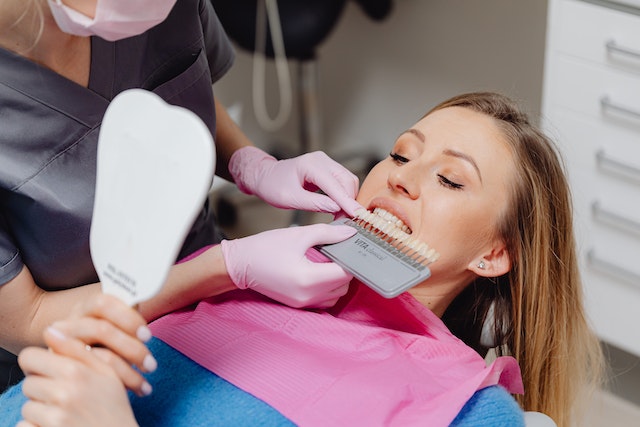
You finally did it. You took the plunge and visited a teeth whitening dentist. They look amazing! But now, a few days later, you notice that your teeth are slightly more sensitive than usual.
Don’t worry, you’re not alone. It’s relatively common to experience some sensitive teeth after whitening. But there are some things you can do to help ease the discomfort and get back to enjoying your beautiful new smile. Here are 8 tips to cope with sensitive teeth after getting them whitened.
1. Avoid hot or cold drinks for the first 24 hours after your whitening treatment.
Firstly, avoid eating or drinking anything cold or acidic, as these can exacerbate the irritation caused by the whitening process. Additionally, try rinsing your mouth with peppermint tea or Club soda to soothe any discomfort.
2. Use toothpaste for sensitive teeth.
Toothpaste can be the cause of tooth sensitivity. When choosing your toothpaste, make sure that it doesn’t have any added fluoride or else you might experience pain when brushing!
3. Take ibuprofen if you’re in pain.
Ibuprofen can help you avoid tooth sensitivity, so it’s a good idea to take one if your teeth are hurting.
4. Rinse your mouth with salt water.
The easiest way to avoid sensitive teeth is by rinsing your mouth with salt water.
5. Drink through a straw.
After teeth whitening, it’s essential to drink through a straw for sensitive gums. The process will help keep your mouth from getting too dry and uncomfortable as well as protecting against sensitivity by providing an artificial barrier between outside elements such as air particles or temperature changes which might trigger pain signals travelling through sensory nerve endings on their way into our brain.
6. Eat soft foods for a few days.
Go easy on the hard stuff for a while. Soft foods like fruit, vegetables and broth will help with any pain you feel when chewing or talking, so eat those instead of something harder such as an ice cream cone!
7. Avoid acidic foods and drinks.
The best way to recover from sensitivity after teeth whitening is by quitting or cutting back on the number of acidic foods you eat.
8. Brush and floss gently but thoroughly.
Gently brush your pearly whites twice per day to help combat any pain or discomfort caused by sensitive gums; use an appropriately sized nylon interdental brushes (or microfiber) for this purpose instead of regular old toothbrushes that are too large- they’ll get stuck in between gaps where there shouldn’t fit anything!
There are many different methods for whitening teeth, but one of the best way to whiten teeth is professional teeth bleaching. This process involves using specialized bleaching gels to eliminate stains and discolouration from the enamel of your teeth. Not only is professional bleaching clinically proven to be more effective than other at-home options, but it also minimizes any risk of damage or irritation to your gums. Laser Teeth Whitening in Sydney is a great way to get whiter, brighter teeth. Cosmetic teeth whitening is a treatment that uses the power of laser technology for an affordable and effective solution that’s not only fast but long-lasting too.
Dental sensitivity is a common side effect of teeth whitening and can range in severity from mild discomfort to severe pain. If you continue to experience pain or sensitivity after following these tips, be sure to consult your dentist, as they may be able to recommend other strategies that will work better for your case. In most cases, however, dental sensitivity is a temporary side effect that should resolve within a couple of days. So don’t worry too much about it and instead focus on taking care of your teeth and gums to help speed up the healing process.
By following this dental advice, you can rest assured that your smile will stay healthy and look its best long after teeth whitening has faded!

